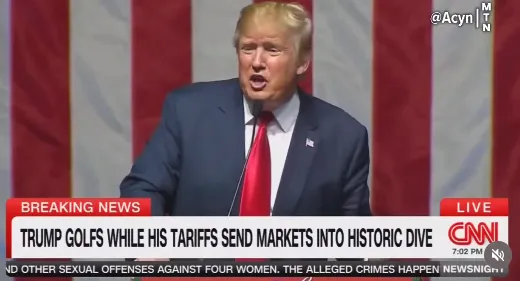After Trump skipped the dignified transfer of four US soldiers killed in Lithuania to play golf, CNN aired a montage of Trump criticizing President Obama for playing golf

In a move that has ignited widespread controversy, President Donald Trump opted to forego attending the dignified transfer of four U.S. soldiers killed during a training exercise in Lithuania, choosing instead to attend a golf event at his Trump National Doral resort in Florida. The decision, made on April 4, 2025, has drawn sharp criticism from across the political spectrum, prompting CNN to air a pointed montage of Trump’s past remarks lambasting former President Barack Obama for playing golf during his tenure. The juxtaposition of Trump’s absence with his earlier critiques has fueled a firestorm of debate, exposing a perceived hypocrisy and raising questions about his priorities as commander-in-chief just months into his second term.
The four soldiers—Staff Sgt. Troy S. Knutson-Collins, Staff Sgt. Jose Duenez Jr., Staff Sgt. Edvin F. Franco, and Pfc. Dante D. Taitano—lost their lives when their M88 Hercules armored vehicle sank into a peat bog during a NATO-related exercise in Pabradė, Lithuania, on March 25. After days of searching by U.S., Lithuanian, and Polish teams, their bodies were recovered and honored in a solemn ceremony by Lithuanian President Gitanas Nausėda before being flown to Dover Air Force Base in Delaware. The dignified transfer, a military tradition where fallen service members are received with honor, typically sees high-level officials in attendance, often including the president. This time, Trump delegated the duty to Defense Secretary Pete Hegseth, while he jetted off to Florida for a Saudi-backed LIV Golf tournament dinner and a subsequent round of golf.
The backlash was swift. On X, posts erupted with outrage, with users like lawyer Tristan Snell writing, “Trump abandons fallen soldiers, goes golfing instead,” and veterans voicing disgust at what they saw as a snub to those who died in service. “I’ve never been so embarrassed to be an American,” wrote Blythe Potter, an Iraq War veteran, capturing a sentiment echoed by many. Lithuania’s heartfelt farewell—thousands lining Vilnius streets, Nausėda saluting the hearses—stood in stark contrast to Trump’s absence, amplifying the criticism. Democrats pounced, with Rep. Pat Ryan, an Army veteran, calling him a “draft-dodging coward,” while even some Republicans quietly grumbled about the optics of a president prioritizing leisure over duty.
CNN’s response was surgical. On April 5, anchor Abby Phillip introduced a montage of Trump’s past golf-related jabs at Obama, culled from 2015 and 2016 campaign rallies. “Obama played 250 rounds of golf,” Trump had scoffed in one clip, promising, “I won’t have time to golf—I’ll be too busy working for you.” Another showed him mocking Obama’s time on the links as a sign of neglect, vowing he’d never do the same. The irony wasn’t lost on viewers as the network cut to footage of Trump, golf cart in tow, at Doral while the stock market tanked over his tariff policies and the soldiers’ families mourned. “This is peak not giving a damn,” Phillip remarked, quoting an anonymous White House official who’d told The Washington Post that Trump had hit a new level of indifference.
Trump’s history with dignified transfers adds fuel to the fire. During his first term, he attended just four of 96 such ceremonies, reportedly shying away after a 2017 clash with Bill Owens, father of a slain Navy SEAL, who refused to meet him. Critics point to this pattern—avoiding the somber duty when it suits him—while supporters argue presidents aren’t required to attend every transfer, noting Biden’s sporadic presence too. Yet, the golf detour, tied to a Saudi-funded event netting his business millions, stings differently. “His code is the Saudis pay, so he plays,” tweeted Ron Filipkowski of MeidasTouch, a barb that’s stuck as evidence of self-interest over service.
The White House pushed back. Press Secretary Karoline Leavitt defended the decision, stating Hegseth’s attendance honored the soldiers adequately and that Trump was “always working for Americans,” citing his Florida trip as part of broader diplomatic efforts. A Saturday statement even boasted of Trump’s golf prowess, claiming he’d won a Senior Club Championship round—hardly quelling the uproar. On X, MAGA loyalists rallied, dismissing the criticism as a “liberal witch hunt,” with one writing, “He’s not their babysitter—he’s fixing the country.” But the defense rang hollow for many, especially as Lithuania’s reverence for the fallen underscored Trump’s absence.
The incident dovetails with broader turmoil. Trump’s “Liberation Day” tariffs, announced days earlier, have tanked markets and strained allies, adding to the narrative of a leader detached from consequence. CNN’s montage didn’t just highlight hypocrisy—it framed a presidency where personal gain and public duty seem at odds. For the soldiers’ families, who requested no media at Dover, the focus stays on their loss, not the politics. Yet, as Nausėda’s words—“We understand what honorable duty is”—echo online, Trump’s golf swing feels like a misstep that’s hard to unsee, a moment where leadership faltered when it mattered most.






